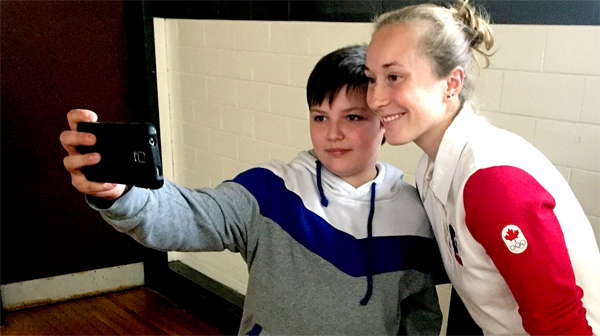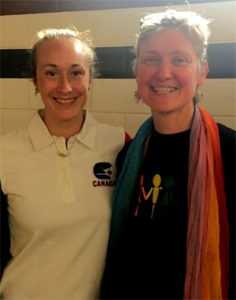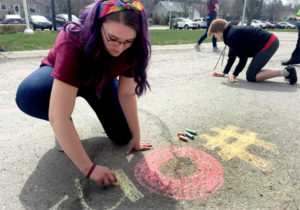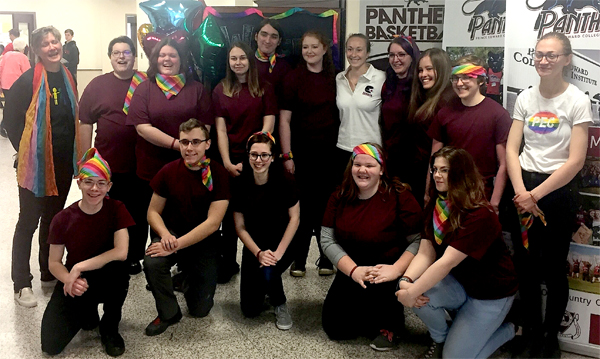Canadian Olympian shares journey of coming out as a gay athlete
Administrator | Apr 29, 2018 | Comments 0

Canadian Olympian Rosie Cossar told her audience at PECI about the importance of inclusivity. Following, she spoke with individuals and took time for photographs
Story and photos by Olivia Timm
In the spirit of inclusivity, Prince Edward Collegiate Institute students and faculty welcomed Canadian Olympic athlete Rose Cossar to speak about her rhythmic gymnastics quest, and her personal pressure to work hard – out of fear – to come out gay.
Cossar, known as Rosie, represented Canada at the 2011 World Rhythmic Gymnastics Championships, the 2011 Pan American Games and the 2012 Summer Olympics. Today, the 26-year-old speaks across the country about the importance of inclusivity and acceptance.

Rosie Cossar with PECI teacher Janet Curran, who arranged the visit.
PECI principal Darren McFarlane challenged those gathered in the gymnasium Friday to think about how they can change something in their daily lives to make people feel included.
”Inclusion extends beyond age,” said McFarlane. “Inclusion takes in all aspects of life: your background, your body type, your orientation, your gender, where you come from, your ethnicity, your religion and on and on.”
Respected in her sport, Cossar captained Canada’s rhythmic gynastics team and made friends all over the world. Throughout her journey, however, she felt isolated, and alone but now recognizes how lucky she is to be in an environment that accepts her for her true self.
The most common question she is asked, is ‘When did you know you were a lesbian?’ to which she answers ‘Well, how does someone know they are straight?’ Noting she has four sisters, she grew up thinking her feelings for women were simply admiration, but thought nothing more of it.
”I had no exposure to the LGBT (lesbian, gay bisexual and transgender) community,” Cossar said. “The only time I heard the word ‘gay’ was when I heard it used as an insult, only. When I was 14 or 15, I started to realize that the way I felt about women was different than the way I was expected to feel, number one; but also the way I was expected to feel about boys, I wasn’t feeling.”
At age 15 she wrote in her journal the words ‘I am gay’. She said she felt she couldn’t hide anymore, and had to accept ‘coming out’ to others.
She confided first to her younger sister Emily, who became her sidekick and main support system. She then shared her identity with her mom, who at first didn’t accept it and told her, “Don’t be ridiculous.” Cossar said it took time for her mother to give the love and support she needed, but she has her family’s encouragement now.
But Cossar felt she still couldn’t come out to her team and while she was performing, began feeling less like herself.
”I had to lie so much. I became so sick of lying. It’s exhausting having to lie every day and show people that you are someone who you’re actually not.”
Teammates took notice during competitions and suggested she was bipolar, which Rosie understood as there were times where she was so good at being someone she wasn’t.
”As much as I was really struggling, I had this idea in my head that I had to work harder than anyone else because I figured that one day, people were going to know about my sexual orientation whether I came out or because it slipped out,” said Cossar. “When that day came, I wanted to make sure the gymnastics community, my coaches, my teammates, my parents, had no reason to kick me off the team. I wanted to make sure I was the best on the team. That was a lot of pressure, to work that hard out of fear.”
Her love for hoops and ribbons began innocently enough, at five years old, attending her first rhythmic gymnastics class with her older sister. She laughed noting the only reason she got involved was because her parents needed some quiet.
”I went simply because my parents wanted to get me out of the house. I was bouncing off the walls at all times!”
Female-only rhythmic gymnastics, Cossar said, creates a unique environment focused on girly good looks as well as talent.
”There is this idea in rhythmic gymnastics about what it means to be a woman, and it’s kind of this one image of ‘woman.’,” she said. “Of course, as everyone knows, a woman can mean so many different things. When I was five-years-old, I was a tomboy and I think I even thought I was a boy. I was always hanging around with the boys and wanting to get my hands dirty. I didn’t care about frills, I didn’t care about looking pretty; none of that stuff, so it was interesting that I ended up in rhythmic gymnastics which is all about kind of being pretty on the carpet.”
By the time she eight, her coaches saw talent and sent her to Russia, which began her career in the high-performance sport. In the years following, Cossar didn’t spend a lot of time at home.
After training in New Brunswick with ‘The Dragon’ – one of the best trainers in Canada – she ended up jumping 50 spots – 54th to 4th place – from her first national championship to her second. This was the improvement that caused the Canadian National Federation to tell her she was ready to represent Team Canada at international competitions.
She was 11 when she performed at her first international championship in Belgium called ‘The Happy Cup.’
”I came 8th overall. That means that I made finals and the top eight athletes to make finals get a gift. This was a life-changing moment for me. As you can imagine, getting a gift basket so big that you can’t hold it yourself can be extremely exciting for an 11-year-old. At that moment I knew that I was going to have to train really hard for the rest of my life because I needed more gift baskets.”
Between 11 and 17, she competed around the world while maintaining school work.
At the time she was 17, a Canadian group in rhythmic gymnastics had never qualified for the Olympic Games. The Canadian Gymnastics Federation chose the best six individuals for the opportunity, and Cossar was selected as team captain.
Their first world championships was in Japan and the underdogs placed last. Two years later, the qualifying year for the London 2012 Olympic Games, the team placed in the finals of the world championships and qualified for the games in London.
She was feeling proud, but not happy about pretending.
”I just represented my teammates. I just represented my club, my city, my province, my country and yet I was not representing myself. I was wearing a mask,” said Cossar.
Cossar opened up to her teammates and publically came out in 2014, two years after the games, in which the team placed 11th.
Since, she advocates for LGBT rights and is the lead for #OneTeam, an LGBT inclusion program launched by the Canadian Olympic Committee which includes more than 50 athletes who support and speak out. After being out of school for five years, she attended the paramedicine program at the University of Toronto.

Sierra Baverstock-Pitt drawing #OneTeam on the pavement at PECI following Rosie’s presentation.
Grade 12 student Emily Boone said Friday morning’s event was a fitting end to PECI’s annual ‘Spirit Week’ activities.
“We are one team. We value diversity and we think it’s beautiful and it needs to be celebrated. We embrace everyone’s opinions so we are really happy to have Rosie here and talking about inclusivity within our school and community,” she said. “The difference is astounding, how confident and happy she is compared to before she came out.”
Boone is team captain of the school’s Social and Environmental Justice League which plans events promoting the school community as one team, but she gives the credit to teacher Janet Curran for linking with Cossar.
Curran met her during a ‘Singing Out Chorus’ event in Toronto. When a friend told her the young woman she just chatted with was an Olympic athlete who promoted inclusivity around the country, Curran realized what a great opportunity it would be to have her speak at PECI. Within three weeks, Cossar agreed, and the plan was set into action.
Friday, Curran thanked her for her bravery and for sharing her story.
”I think that, through your talk Rosie, everybody in this gym has recognized themselves. All of us have felt, ‘I don’t belong. I’m not accepted. I’m scared to walk the hall of that school. I’m scared for the first day of Grade 9 and I don’t know what people are going to say about me,” said Curran. “As one of the members of the PECI Justice League, I would like to invite everyone that is here today to remember that Rosie has lived through it and is doing such amazing work, and we can do the same thing.”
The event was also attended by roughly 15 students from other schools in the Hastings and Prince Edward districts, as well as the schools athletic councils and Gay-Straight Alliance group members.
Following the presentation, teachers along with the Gay-Staight Alliance members and Athletic Councils had a workshop to brainstorm ways for schools to continue showing inclusivity and diversity.

PECI Social Justice league members and teachers Janet Curran, Marian Moon, Allison Juby, Carolyn Cole, Jacob Sullivan, Logan Reed, with Rosie Cossar, Sierra Baverstock-Pitt, Emily Boone, Eric Klassen and Katie Curran. At front: Malcolm Ross, Aaron Wilk, Ellie Ball, Katherine Reddick and Hailey Quaiff.
Filed Under: Featured Articles • Hastings & Prince Edward District School Board • PECI - It's a Panther Thing • Sports & Recreation
About the Author:































